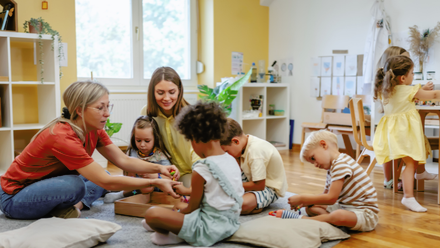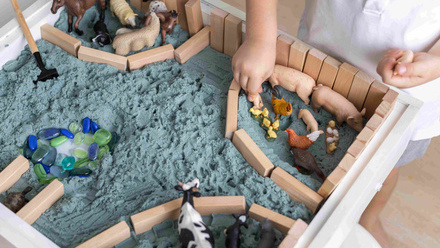How to support parents and carers engaging in their child’s early literacy

The home learning environment – the main physical home and the relationships a child has within it - is the most powerful tool for developing a child’s communication and language skills. Studies show that the quality of the home learning environment is a key predictor of a child’s future success across all areas of learning.
Did you know?
Effective parent engagement approaches have approximately an additional five months’ additional progress impact on a child’s attainment!
In this learning workout, we are going to explore some ways we can harness the power of parent/carer engagement and support early literacy in the home learning environment.
Early Literacy refers to the initial skills developed in the process of becoming literate in language, reading and writing. Early literacy approaches aim to improve confidence, understanding and strategy within these emerging skills.
Early literacy starts in the womb, when a foetus begins to acknowledge the sounds they can hear from outside. Early literacy is intrinsically built into communication and language, including our ability to listen closely, communicate verbally and develop our sense of narrative. Of course, it also includes the skills more commonly associated with literacy, like reading and recognising graphemes (the letters we write down).
People at home are some of the most influential people in a child’s life and it is important to recognise the incredible value they can bring to our practice in early education and care. By working together in productive partnership, educators and family can create the best environment to allow children to thrive in their early literacy and beyond.
It is important to acknowledge that some children will have additional barriers to accessing a quality home learning environment, including financial circumstances, the education of grown-ups at home, disability and more. It is valuable to understand the potential impact of such circumstances and provide an inclusive environment with opportunities for all.
Communicate
But it’s not just about communicating with parents and carers about what they can do with the children to support early literacy – helping them to understand their impact and why it makes such a difference can improve partnerships in many other ways, too.
- Using learning journals, highlight the ways that literacy is developed through observations made during their day at the setting to develop parent/carer understanding of what learning is going on.
- Ongoing general communications, such as ‘book of the week’ posts, are effective ways to create an underlying culture in the setting that values reading for pleasure. It is also a useful way to signpost appropriate stories for those who might be unsure of what to choose for their children.
Send stuff home
Around 20% of parents and carers say they don’t have the time to read with their children, but are often in the environment in which a child spends the majority of their time. Sending home some literacy resources can help bridge the gap between home and setting, and engage those at home in furthering learning opportunities.
- Send home mini story sacks with a chosen book to borrow, including a brief guide on how to use the story sack and highlighting the learning that takes place when they use it.
- Create early phonics activities that use few resources to give parents and carers the confidence to implement activities in a meaningful way, like sending home handouts for listening walks.
Create opportunities
Parental involvement can sometimes be considered as entirely separated from the interactions in a setting. Creating valuable opportunities for collaboration offers a wholesome and enriching experience for children to recognise this and draw upon both family and setting at the same time. It is also a great way to build a rapport with families and nurture an inclusive environment for all.
- Libraries are treasure troves to explore with little ones! Not only are they a positive place to embrace a love for reading, but they are also accessible to all as a free provision for acquiring books. Why not do a trip with parents and carers? Allow children to absorb the literary surroundings whilst you inform grown-ups of how they can make the most of the space, too.
- Event days like World Book Day are great opportunities to raise a conversation about reading and get everyone involved in the fun, regardless of age! Whilst it is popular for settings to encourage dress up days, it can also be a prominent time to raise the importance of early literacy with some fun activities for all.
Key takeaway
Early education and care settings play an instrumental role in developing children’s early literacy and in setting the foundations for their life-long love of reading, to thrive in the world beyond. But it’s important to recognise and remember how significant parents, carers and others at home are to supporting children’s learning, both through their attainment and attitude.
As professionals, it is as necessary for us to support the grown-ups with understanding the value of early literacy as it is for the children themselves.





